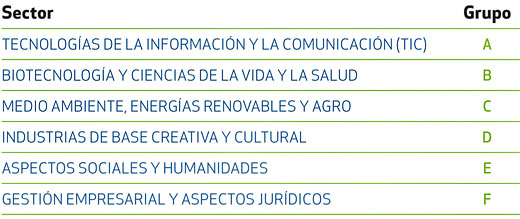Detailed information

The Spanish University Law (LOU) establishes that one of the missions of the university is "the dissemination, valorization and transfer of knowledge at the service of culture, quality of life and economic development". Thus, the LOU adds a new objective to other existing objectives such as "knowledge transfer (teaching) and "generation of knowledge" (researchers): knowledge transfer.
This project is focused on one of the most relevant aspects of the new model of knowledge transfer: the creation of companies as a valid alternative in order to perform the transfer of knowledge, R&D and /or technologies developed at the university (the so-called spin-off companies). Within this framework, "The Route of Entrepreneurship" was created with the following objectives:
- Promoting the entrepreneurial culture among the university community;
- Fostering the development of business projects;
- Introducing transversal training courses in the University of Granada;
- Promoting networking with the socio-economic environment.
University entrepreneurs
A variety of factors must be considered before creating a spin-off company as a catalyst of knowledge transfer: the product (which, in the case of university spin-off companies is usually associated with R&D capabilities and results); the entrepreneur (and the company's human resources); market demand and needs, etc. "The Route of Entrepreneurship" project is focused on the second of these factors: the entrepreneur.
The range of university entrepreneurs includes researchers (the most closely related with research and innovation); trainees, PhD students and postgraduate students (with a weaker connection to research and research groups than researchers); and finally last-year students (more closely connected to knowledge than to research). In general terms, entrepreneurs can be classified into three groups:
- Professors and researchers with a permanent relationship with the University and administrative staff.
- Trainee research staff without a permanent relationship with the University.
- PhD, master or last-year students.
University entrepreneurs have different characteristics, as follows: the Teaching and Research Staff have clearly defined professional goals and there are no specific training plans aimed at them that include entrepreneurship skills. Trainees and students are more accessible, since they are still receiving training and can be educated on entrepreneurship through PhD and master courses, centers, etc. All entrepreneurs in these groups can join "The Route of Entrepreneurship" program (see Section below). Entrepreneurs can be approached in different ways.
Master and PhD students are approached through their coordinators in collaboration with the Vice-rectorate for Graduate and Postgraduate Education. Specifically, master courses have been grouped by areas of interest for the industry (see Section below). The advantages are evident: on the one hand, transversal education (i.e. shared skills) is introduced into master programs; on the other hand, aspects related to entrepreneurship are included in the master (which is often required and rarely offered). In addition, new opportunities emerge for students thanks to the involvement of other stakeholders from the Local Department of Innovation, Science and Business such as the Red Andalucía Emprende foundation (CADE), or the agency IDEA.
Phases of "The Route of Entrepreneurship"
The "Route of Entrepreneurship" is composed of three phases that progressively require more dedication from participants. "The Entrepreneurship Route" offers guidance on different aspects related to the entrepreneurial culture and provides the participants with the tools necessary to develop their entrepreneurial skills. Below you can find a general description of the three phases:
- A tour around the business incubator and accelerator BIC located at the Healthcare Technology Park of Granada (one morning). Participants are shown the mechanisms and organisms involved in the creation of a company. An entrepreneur gives a short talk on his/her experience. Then, a visit is organized to different companies of the sector of interest where other entrepreneurs share their experiences.
- Workshops for entrepreneurs (two days). Specific workshops focused on motivation and skill development are organized for those who showed interest during the first phase.
- 3. Training course (five days). Those needing a more comprehensive training are offered an advanced course on business creation, business operation plan design, practical cases, simulations, etc.

The objective is that as many potential entrepreneurs as possible participate in phase 1. If their interest is captured, they will pass to the other phases. Thus, Phase 1, which only takes one morning, will be devoted to ignite the entrepreneurial spirit of participants so that they voluntarily want to join the following phases.
One of the keys to the success of this plan is that it will be developed in collaboration with the two main agents from the Andalusian Regional Government involved in aspects related to entrepreneurship, the Agencia de Innovación y Desarrollo de Andalucía (IDEA) and Andalucía Emprende, Fundación Pública Andaluza.
Groups by sectors
A range of strategic sectors were considered for the implementation of the first phase of "The Route of Entrepreneurship", and visits to BIC-Granada facilities have been organized by sectors.



